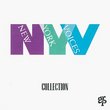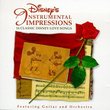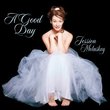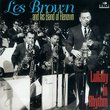| All Artists: Hot Club of San Francisco Title: Bohemian Maestro: Django Reinhardt and the Impressionists Members Wishing: 3 Total Copies: 0 Label: Azica Original Release Date: 1/1/2008 Re-Release Date: 11/25/2008 Genres: Jazz, Pop Style: Swing Jazz Number of Discs: 1 SwapaCD Credits: 1 UPC: 787867224120 |
Search - Hot Club of San Francisco :: Bohemian Maestro: Django Reinhardt and the Impressionists
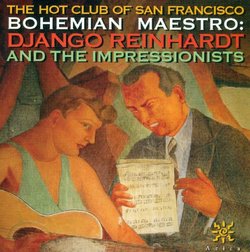 | Hot Club of San Francisco Bohemian Maestro: Django Reinhardt and the Impressionists Genres: Jazz, Pop
|
Larger Image |
CD DetailsSimilarly Requested CDs
|
CD ReviewsFantastic Gypsy Jazz and Swing!!!!!!!! Douglas R. Martin | San Francisco, CA | 01/29/2009 (5 out of 5 stars) "I cannot hold a flame to Monterey Jack's review of this disc on his site: (www.djangology.net) but I thought I'd do a short review to let folks know about it here too because this is a fantastic album that is truly worthy of exposure. The HCSF is headed by Paul Mehling (guitar), and also includes Evan Price (violin), Jason Vanderford (rhythm guitar) Jeff Magidson (rythm guitar) and Clint Baker (bass). On this album you'll also hear the welcome addition of special guests pianist Jeffrey Kahane as well as the Aeros wind quintet (www.aerosquintet.com) on select tracks. When I talked to Paul Mehling last year about this album as it was in the works he was telling me that the Hot Club wanted to do an album that was part swing, part classical album and partly a reflection of music that Django would have been exposed to and heard and influenced by during his life in Paris. This concept in addition to recording some of the more obscure Django pieces sounded really interesting at the time and I couldn't think of any other album that took on this idea. You can find all the above mentioned elements and more in the CD. Swing among the Hot Club's original compositions such as Mehling's up tempo opener Le Sourdoe and Evan Price's swinging original Le Jongleur as well as Django's uptempo Vendredi 13 and Diminishing Blackness which also feature pianist Jeffrey Kahane. These guys are just burning and swinging out the door on Vendredi 13! On the more classical side you'll find a FANTASTIC arrangement of Django's Mass composed for the Romany people which has been beautifully arranged by violinist Evan Price for wind quintet performed by the Aeros Quintet. ALL fans of Django NEED to hear this! This track is actually a medley as the mass then goes into Django's Improvisation #1 done collectivelly by Mehling's guitar with the Aeros quintet. Brilliant! Further examples of classical influence are shown by Hot Club's full band arrangement of Django's Improvisation #3. Ending the album is the meloncholy duo of Mehling's guitar and Price's violin doing Claude Debussy's Claire de Lune. You'll find additional gems on the album such as Mehling's early Djangoesque banjo-guitar playing on Jelly Roll Morton's The Pearls (nodding to Django Reinhardt's early years playing banjo-guitar in the Bals Mussette of Paris accompanying accordian players). You'll also hear Evan Price playing bowed saw on Mehling's Waltz for MC Escher. You'll find latin rhythms on Hot Club's rendition of Choro by Hector Villa Lobos as well as Django's Bolero (not troublant bolero - do your homework!) and the whole gang jamming HARD on George Brassen's Les Copanins D'abord, being the only non period composition on the album. All in all I highly recommend this album as it showcases some of Django's less often played compositions as well as fantastic originals and brilliant arrangements. The arrangement of the Mass, Improvisation #1 and Improvisation #3 alone make the album worth it in my opinion. Do yourself a favor and check this out because this is one of the few gypsy jazz albums I've heard in a LONG time that made me think, "wow this is really fresh and different". The recording quality is fabulous as well. It's been in my CD player ever since I got my hands on it! " A Transitive Nightfall Of Diamonds Shepherd Siegel | Seattle, WA USA | 07/04/2009 (5 out of 5 stars) "Bohemian Maestro: Django Reinhardt and the Impressionists Django Reinhardt played music with unsurpassed lyricism, virtuosity, sophistication and beauty. He invented a genre of which he is the sole icon. That music, simply and roughly described as an intermingling of jazz, musette, and gypsy, has been a diamond bursting forth shadowed light down through the 20th century, unfolding into this one with an international array of Django disciples replicating the form and dance of Reinhardt's Quintette du Hot Club de France. The musicality and obsessions of Django's followers hammer at this diamond with cleaner recordings, faster licks, novel treatments of pop songs, in and out of the style, and so forth. But none of these efforts could crack that gem to yield any new light, a pathway to where the genre might lead and grow. Until now. It is fitting that it would take Paul Mehling (the artist also known as Pazzo) and his Hot Club of San Francisco 20 years and 11 releases before bringing us to this turning point in gypsy jazz. And fitting that it should be named Bohemian Maestro after the man himself; and that it feature a mysterious WPA-era image purported to be Mr. Reinhardt on the cover. But Mehling's disciplined work--countless hours of woodshedding, rehearsal and performance; astute study of the genre and the man; assiduous attention to recording detail; painstaking assembling of the ideal ensemble; and finally, an aesthetic sensibility brought to the concept of the album--has given birth TO a concept album that sets the new standard for recorded gypsy-swing, and more importantly and finally, breaks through the dazzling gravitational force of Django's stratospheric music to show that there is life and growth and newness still in this form of acoustic improvisational music. Boldly go. It took artists as major as Frank Sinatra and the Beatles to use the LP record as a medium where its characteristics were made to serve the music, as in Wee Small Hours and Sgt. Peppers Lonely Hearts Club Band. Mehling's HCSF is one of the few to fully understand the advantages and constraints of the compact disc, even more than twenty years after its introduction, even as it is threatened in a world of downloads. Like a band with a deep catalog giving a great concert, Bohemian Maestro fills the disc with no filler, and is divided into two short `sets' and a lengthier third, each showing different dimensions of the band, and each a gateway to gypsy swing's future. The album comes on strong, with Le Surdoué (The Child Prodigy), a Mehling composition made up of Django fragments, that shows off the bands mastery of tempo and harmony, and beckons a dynamic ride. The set continues to show off the sophisticated level of ensemble the HCSF now embody. In Vendredi 13 and Diminushing Blackness, the band is joined by classical and jazz player Jeff Kahane on piano. Though Pazzo notes that it was not unusual for pianists to sit in with Django, and that they are in particular paying tribute to Ravel, who was known to, it is a novel sound nonetheless--recordings of the original Hot Club playing with piano are quite rare and unknown. This is the first clue that something new is afoot. The next set is the centerpiece of the album, and it is bookended by the excerpted Debussy theme Pour L'Egyptienne. And now the message is clear: Bohemian Maestro is about form, and it distinctly connects Django Reinhardt's music to the great composers of his time. In this middle set the case is made, and the band draws seamless connections between Debussy, Poulenc, and Reinhardt. Mehling's Waltz for M.C. Escher connects that living past to now. But like all great performers, the HCSF has saved the best for last, and throws a bit of misdirection our way as they open the final set with Jelly Roll Morton's The Pearls. The liner notes explain the stretch and that Django started out playing banjo, which is featured here. But the other back story is that Pazzo himself began his performing career on the banjo playing happy hours in Santa Cruz, California, with Dixieland band Jake Stock and the Abalone Stompers. The song has a very down home and playful feel, Pazzo's banjo lending an old-fashioned air to it. It reminds me of Splash Mountain, based upon the movie Song of the South, and one of the most excellent rides at Disneyland. But I digress. The Pearls completely throws the listener off guard with its happy-go-lucky sound, for it is followed by the Impressionist masterpieces of the album. Reinhardt's Nymphéas receives a stunning Gil Evans type arrangement from the Hot Club's violinist Evan Price. Wispy feints and flirtations from the Aeros Quintet set the stage elegantly for Pazzo's eventual entrance. It's one of his most tasteful solos to date, beautifully framed by the arrangement; again, making form the defining feature of this album, making form the golden road to gypsy swing's evolution. And what better Rosetta Stone for traveling that road than Django's foray into a formal piece, his Messe, an unfinished and lost composition reconstructed by Price and Mehling. They do a yeoman's job of envisioning what this Mass might have been, with a woodwind quintet that the featured composers Villa-Lobos, Poulenc, and Ravel might well have used. This rewrite of history throws the Gypsy master smack dab in the middle of any portrait of early-to-mid 20th century composers. Price's arranging skills help us make the most of Reinhardt the composer through his treatment of Improvisation No. 3, as a suggested next movement for the incomplete Mass. For my money, the four pieces Pearls > Nymphéas > Messe/Improvisation > Improvisation No. 3 form the heart of the album and a pinnacle achievement for gypsy swing. But they're not done with us quite yet. First, after bringing Kahane back for an encore jam on Les Copains D'Abord, HCSF reiterates its thesis in duet form, closing with a delicate and haunting rendition of Debussy's Clair de Lune. Again the images of shadows and light, of a diamond surrounded by crystal, sparkle and reflect. Pazzo has always found and shared the enjoyment of great partners throughout the HCSF odyssey, but this duet celebrates his greatest and most enduring collaboration, that with Evan Price, whose arrangements take the Club to dynamic heights and alchemical opportunities for his and Pazzo's strings to ascend. Second, this is no finale. As I've said, Bohemian Maestro is a gateway to the future of the gypsy swing. The diamond has been penetrated and lovingly exploded. New light invites new adventure. Quiet on the set. Lights. Action. Music. Swing." Not just great, it is also simply Phenomenal! Blue Coronet | east coast | 05/31/2009 (5 out of 5 stars) "BOHEMIAN MASTERS: Django Reinhardt and the Impressionists includes swinging Gipsy Jazz, Gipsy-Classical Mixes, and simply a heck of a lot of fine, inventive, and soulful playing. It is new and old at the same time, in a fresh - rather than tired - fashion. This isn't retro music, but Gipsy Chamber music for the 21st century. All of the music and musicians are first class. Hard to list favorite tracks, as I frequently play the entire CD."
|

 Track Listings (16) - Disc #1
Track Listings (16) - Disc #1